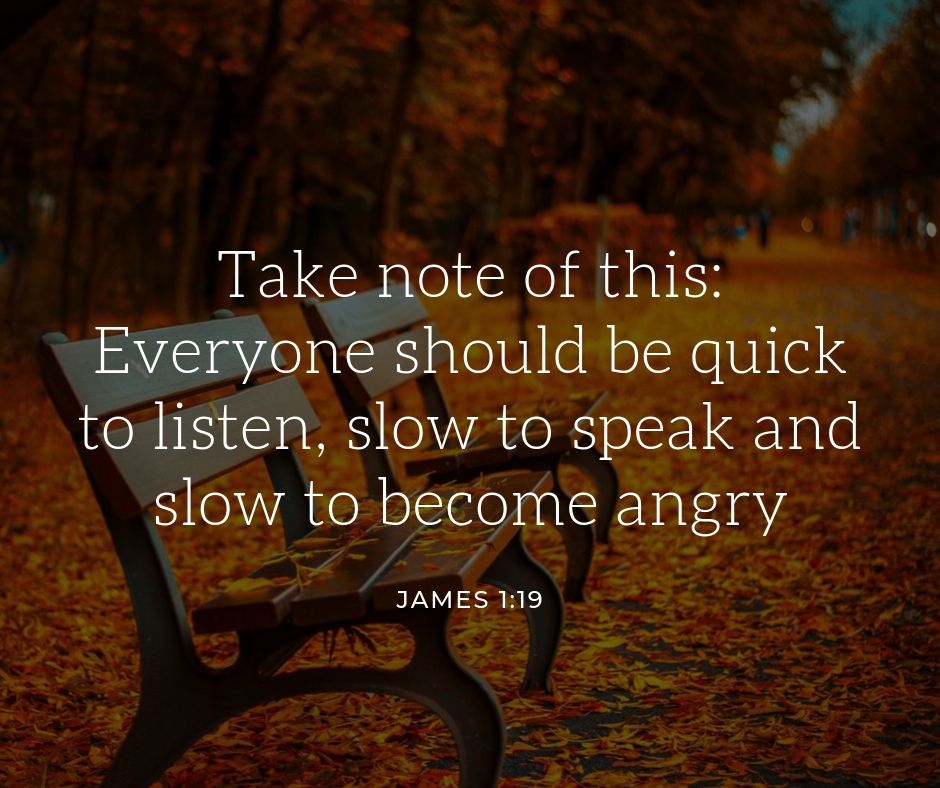Getting angry feels powerful, like we’re doing something proactive. Simply put, we get angry because we think it works. But James 1:19–20 is clear that it doesn’t. Because there’s something anger can’t do.
Re-reading James 1:19–20
James 1: 19 is familiar: “Take note of this: Everyone should be quick to listen, slow to speak and slow to become angry.”
As much as we like the three easy steps, trying hard to do these things is not James’s point. By turning verse 19 into a checklist, we try to plug in to its power but we miss the real point.
James 1:19 is not a list of communication strategies. Okay, well it is a list of communication strategies. We all know good communication is built on listening more and talking less and not overreacting to what someone says.
But verse 19 is not in the Bible just to make us better communicators. It’s the key to godly communication. The pattern Jesus followed when he talked to people. It is God’s how-to guide for conversation without control.
The reason we miss this truth, of course, is that we’ve cut the idea in half. We focus so much on our chapters and verses that we treat each verse as a thought of its own. And sometimes it is. But this time, it isn’t.
The idea of verse 19 continues into verse 20. Put all together, James actually says, “Pay attention, you guys. Everyone needs to listen first and respond slowly, both verbally and emotionally, because our anger does not result in God’s righteousness.” (I’m paraphrasing, obviously.)
A Culture of Anger
According to these verses, anger doesn’t solve our problems.
Human anger can’t produce God’s righteousness. Period. It won’t work for me. For my kids or my spouse. Or for other people or the culture at large. Anger can’t do it.
And yet, anger is our go-to response these days. We don’t listen. We jump in with our ideas and opinions. And we pour out anger like syrup on pancakes. It goes everywhere.

So why do we do it? Why is anger our favorite communication tool?
First of all, anger is easy. We may not yell at a stranger’s face, but we do it online all the time. Someone’s post on social media, a blog, or a news story pops up, and we post our immediate reaction. No filters. No holding back. We don’t know these people or the full story, but we dive in, anger first.
Second, we think anger works.
Parenting is a great example. We may not haul our kids around by the arm or hair, screaming at them in public. But we get angry. We yell. I huff all the time. And we do it because it seems to work. My kids don’t seem to be able to comply until I’m yelling, PUT ON YOUR SHOES! And since I yelled last time, and they did what I asked, I yell again.

We think it works in culture, too. If enough people yell or make demands, people cave to our desires. The person whose email is making national news gets fired. We name-call and crucify everyone we disagree with.
My friend had to change her phone number after it was accidentally attached to another person’s horrible post. She got dozens of awful, hateful texts and calls from complete strangers all over the country (and Canada) who felt it was their duty to decimate the original poster and anyone attached to him. And it didn’t matter that my friend wasn’t involved at all.
We get angry because we think it works. We think it gets us what we want. But we’re wrong.
What Anger Can’t Do
If man’s anger cannot produce God’s righteousness, why does it seem to work?
Because we’ve confused compliance with submission.
We can yell someone into compliance. Force them into external obedience to a command or idea or cultural trend. We can make it so dangerous and damaging for them to stand against us that they learn to toe the line.
But compliance is always external. I can make them behave the way I want. But I cannot touch their hearts. Human anger will never change someone’s heart.
God doesn’t want compliance. He wants submission. Submission is willing, voluntary, internal consent. It is a change of the heart. It is what James describes in verse 21: “Therefore get rid of all moral filth and the evil that is so prevalent and humbly accept the word planted in you, which can save you.”
Anger doesn’t save us. God saves us, and he uses his word to grow our hearts to be more like Jesus. God’s plan is to change us, to fill us with humility and righteousness. It’s his plan for us, for our kids, for our spouse, and for our world. But anger can’t do any of those things in anyone’s heart.
A Purposeful Pattern
These verses give us a pattern with a purpose. When we work backward from verse 20, we will stop seeing a checklist we’re supposed to do for God, and instead see a pattern he empowers in our life.
First we anchor ourselves to the truth of verse 20: Anger can’t produce God’s righteousness. Our anger might make someone obey, outwardly at least. But it won’t change their heart. It can’t produce God’s righteousness.
So then, if we want God’s righteousness in our lives (and our kids’ lives, our spouse, or in culture), we need him to help us slow down our insta-jump to anger. That’s the end of verse 19 (slow to anger).
Whether that’s counting to 10 or taking deep breaths or just repeating these words “My anger will not result in God’s righteousness” in our heads, we have a clear motivation for restraining our angry impulses. And with the truth as motivation and the power of the Holy Spirit, our anger will begin to dissipate.
Then, in the middle of verse 19, as we slow down our jump to anger, we also slow down our words. We simply speak less. When I’m not trying to force people to comply with my orders or my way of thinking, then I will have much less to say. It’s an odd feeling, really, but we’ll begin to notice that we can accomplish more with fewer words. And the world doesn’t actually implode.
And finally, we return to the start of verse 19 (quick to listen). As we don’t turn into raging anger-storms and we begin to speak less, we are able to listen more.
And surprisingly, listening often short-circuits the issues that at one time would have led to angry outbursts. I suddenly realize my kid isn’t trying to make me angry by not putting on her shoes; she’s actually dealing with another problem (maturity, time-management, a sad heart) that resulted in what looked like disobedience, but wasn’t really. More listening, fewer words, and less anger opens up the lines of communication that can lead to a God-ordained moment when righteousness grows.
The Truth About Anger
Human anger can’t bring about God’s righteousness.
That doesn’t mean anger has no place in our toolshed. It does. Anger is a valuable tool that God designed and equipped us with for certain times and certain situations. But our kids’ shoe-blindness probably isn’t one of them.
Used correctly, anger can accomplish what God intends (think Jesus’s response to the moneychangers in the temple). But human anger, my desire to control my world and force compliance in those around me, will never drive my people toward Jesus.
I want my kids’ hearts to be righteous, not compliant. I want the same for me. And I want to be the conduit for Jesus to bring more of his righteousness into our world and culture.
My anger can’t be the channel through which that happens. But I can let God create in me the pattern of communication which is both counter-cultural and capable of seeing God’s righteousness grow.
And that is the real power of James 1:19–20.



